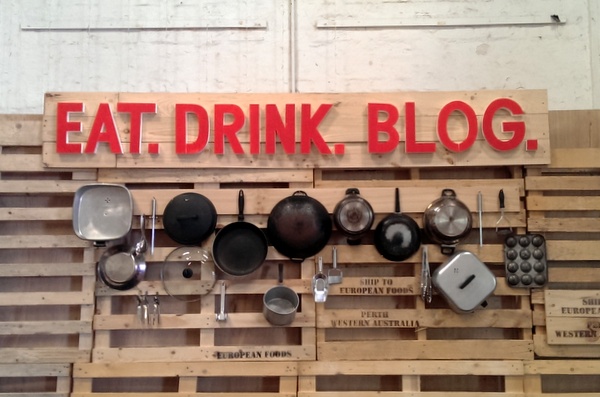Someone finally said it. Maybe, we’re doing it wrong. But perhaps not in the way that we think…
Bloggers = mainstream media
At this year’s Eat. Drink. Blog. conference in Perth, one of the highlights for me was Thang Ngo’s presentation on mobile and the future of blogging. In it, he warned us that if we’re not careful, bloggers could be dethroned by a more tech, mobile and analytics-savvy crew. He pointed out that our success, whether measured by google rankings, page views or the less tangible ‘relevance’, is in many ways a happy accident, whereby traditional media dropped the ball – they got online too slowly and we were already there. But complacency and failure to move with the times could leave us straggling behind.
Every day, it seems we are becoming more and more like traditional media, and they are becoming more and more like us. Could punchy, short, media-rich content save us? Certainly it would drive traffic and increase unique views. And then?
There’s more to blogging than numbers
As bloggers, what’s the aim of the game? Is it to be seen by as many eyes as possible? Of course if we write, we want to be read, so it makes sense to know how to ‘be seen’, but as I write this, the top story on News.com.au is ‘Box Office Bombs: the 15 worst movies in film history’, so clearly numbers are not all there is to blogging.
Saying ‘no’ to PRs
Then something significant happened. For the first time since I first attended Eat. Drink. Blog in 2011, somebody got up and talked about working with PR companies and said something other than ‘just do what feels right to you’ or ‘full disclosure’.
Phil Lees, the blogger behind ‘last appetite’ and Social Media Manager for Tourism Victoria, said that in his opinion, food bloggers shouldn’t write sponsored posts, because sponsorship influences the kinds of things they write about, and that will influence their readers.
This was hardly revolutionary, but all hell broke loose in our little corner of the twitterverse. As Phil himself tweeted:
You are an expert
Let me put it this way. PRs contact you because you are an SME; a subject matter expert. You are an ‘influencer’, with a strong brand. But how did you become an SME, how did you build that ‘brand’? Probably through hard work and dedication. Probably through your unique voice. Probably because you were good at finding something or saying something or doing something in a way that others weren’t. In a nutshell, you knew something they didn’t, and you were willing to share it.
So you’re approached by a PR company, and they basically want to co-opt your brand, grab some reflected glow from you SME status. They offer you whatever they offer you to get you to say something about what they are trying to sell. There is nothing wrong with this, but there is also nothing right with it.
Your blog is your space
As Erika wisely said in her recent post, your blog is your blog much like your home is you home. If someone wants to provide you with a product or experience that you wouldn’t otherwise be interested in and you wouldn’t recommend, your rejection of their offer should be a forgone conclusion. And if you do write sponsored content, one thing that you can never say is “I write what I want, I don’t let anyone else influence my content.” That’s impossible. That’s impossible anyway, none of us are un-influance-able. But it’s certainly impossible if you’re writing sponsored content.
WTF does that mean?
I’m not saying that if you do PR posts, you are an idiot or your readers are idiots; that you say you enjoyed x brand of cocoa and suddenly your readership is rushing out to buy it, and your blog becomes an value-less platform for product spruikers nationwide.
What I’m saying is, brands are paying to take up space in our ‘neighbourhood’, to be part of our conversation, a conversation they may have no right to be a part of. On a micro level, sure, you can do ‘what feels right to you’. On a macro level, a broader trend develops with outcomes we may not yet have anticipated. Brands may have presence and prominence and power that, frankly, they may not deserve.
Check out another presentation that blew my mind back in 2011, Journalist Simon Marnie on why authenticity and diversity of opinion is so important in blogging (apologies for the picture quality of the video).
embedded by Embedded Video
YouTube
I for one am rewriting my editorial policy this week.
About me
 Sharing easy recipes, hunting down the best coffee. Honest accounts, nothing too serious. Read more...
Sharing easy recipes, hunting down the best coffee. Honest accounts, nothing too serious. Read more...Recent Posts
- Aerpress means no more shit #travelcoffee and #workcoffee
- Why I write and four ace bloggers who do it better
- The five best things I ate in London
- Shoreditch is awesome, airports are not
- I quit sugar? Do I bollocks.
- Cubao Street Food, Alexandria
- The Reformatory Caffeine Lab, Surry Hills
- Brewtown Newtown
- Stay caffeinated over Christmas
- Gumption by Coffee Alchemy, Sydney CBD
Popular posts this month…
 Sparkling Long Black posted on May 10, 2011
Sparkling Long Black posted on May 10, 2011  The quest for Mex part 2 – Feisty Chicken Burritos posted on December 21, 2010
The quest for Mex part 2 – Feisty Chicken Burritos posted on December 21, 2010  Bake Sale vs. Cake Stall posted on August 30, 2013
Bake Sale vs. Cake Stall posted on August 30, 2013  Review – Philips Saeco Intelia posted on January 10, 2012
Review – Philips Saeco Intelia posted on January 10, 2012  Café review – Flint and Steel (Coffee Alchemy), Marrickville posted on March 1, 2011
Café review – Flint and Steel (Coffee Alchemy), Marrickville posted on March 1, 2011  How not to order a takeaway coffee posted on March 15, 2011
How not to order a takeaway coffee posted on March 15, 2011  Stay caffeinated over Christmas posted on December 20, 2013
Stay caffeinated over Christmas posted on December 20, 2013  Aerpress means no more shit #travelcoffee and #workcoffee posted on August 2, 2014
Aerpress means no more shit #travelcoffee and #workcoffee posted on August 2, 2014
Disclaimer:
All opinions in this blog are mine, an everyday, real-life person. I do not accept payment for reviews and nor do I write sponsored posts. I do not endorse the content of the comments herein.






